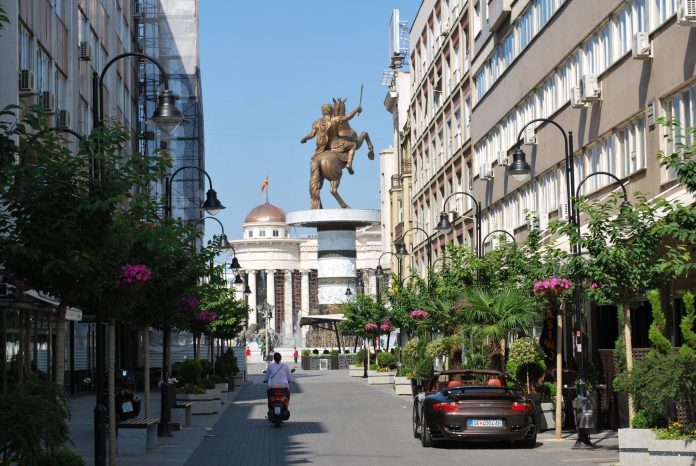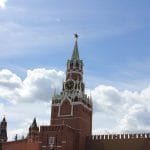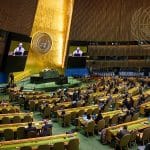North Macedonia’s conservative opposition failed in its November 11 bid to topple Prime Minister Zoran Zaev’s government. This happened only because ruling coalition lawmakers were able to halt a no-confidence vote over a lack of quorum after a single opposition-aligned MP mysteriously went missing, after reporting via social media that he held contacts with foreign diplomatic representatives. This curious turn of events left parliament with one member below the number needed in attendance to hold the no-confidence vote (61 of 120).
The conservative opposition, led by the VMRO-DPMNE party, had indicated previously that if Zaev lost the no-confidence vote they would try to form a new government with new parliamentary allies, if they can be found, before heading to an early election.
With EU accession negotiations indefinitely delayed, the essential objective of the Zaev government, his Social Democratic (SDSM) party performed far below projections in October municipal elections. After these results, Zaev pledged to resign, one of his frequently used tactics.
Developments did not stop there. The SDSM party’s ruling committee on November 27 accepted Zaev’s resignation from the party leadership and scheduled a vote on a successor for December 12. It is believed the new party leader will also be submitted to parliament to replace Zaev as North Macedonia’s next Prime Minister assuming the country does not move toward elections. Local media are reporting that Finance Minister Dimitar Kovacevski is currently the favorite to win as SDSM Chair.
The Long farewell
While there is internal realignment within the SDSM as a result of the heavy losses in the October municipal elections, it is indeed likely now that the SDSM will remain in place as the lead coalition partner in a new government with a slightly larger majority in the 120-seat parliament than it has held up to now. Zaev has spent an extraordinary amount of energy trying to cobble a coalition together before leaving office later this month if, indeed, he departs at that time. Using the usual prospect of launching EU accession talks “soon” as an incentive, Zaev has forged a provisional coalition with a small Albanian party that could provide the new coalition with up to 64 votes in parliament, assuming the country’s largest Albanian party, The Democratic Union for Integration (DUI) does not break ranks over concessions Zaev is making (e.g. more ministerial posts) to lure the smaller Albanian parties into his coalition.
The Bulgarian issue remains unresolved
Since Bulgaria’s November 14 elections, when the tough anti-corruption oriented “We Continue the Change” party (PP), won a plurality, work has been underway on the formation of a new government coalition. Signals from Sofia reveal that a deal is considered close and that a new right and center-left coalition could be announced the week of December 13.
Even so, this timing makes it unlikely that the “fantasy scenario” some Balkan journalists and officials are still pushing for would be possible, that is an almost magical lightning deal between Sofia and Skopje resolving the longstanding bilateral language and identity dispute in time for Bulgaria to lift its veto this year (during the waning Slovenian EU Presidency) on the launch of EU accession negotiations with North Macedonia. Nonetheless, the usual rumors of last-minute initiatives to resolve the bilateral problem this year are circulating, as they do before many European Council meetings. Bulgaria, meanwhile, denies this scenario is even possible and officials in Sofia this week claimed their veto on North Macedonia remains firmly in place.
Washington comes calling, bearing few gifts
Not content to let the North Macedonians work out their own issues at their own pace, the US State Department’s European Bureau Deputy Assistant Secretary Gabriel Escobar, also carrying the title his predecessor picked up during the Trump Administration aka “Special Representative to the Western Balkans” (no essential difference) visited Skopje on December 6.
In this familiarization visit, he met with North Macedonia’s President, Prime Minister, and other key officials. His public comments seemed to focus heavily on support for North Macedonia’s EU integration, which essentially meant nothing since Washington has no real influence on EU Enlargement decisions in Brussels. Instead, the US has been essentially a cheerleader for Zaev since the 2018 Prespes Agreement with Greece that it actively helped the UN forge and has functioned as an informal overseer.
Accordingly, high-level visits and reminders in Skopje and Athens are needed from time to time to keep the Prespes deal from losing traction lest anyone in those capitals begin to speculate the Biden administration has shifted focus to other more pressing concerns.








